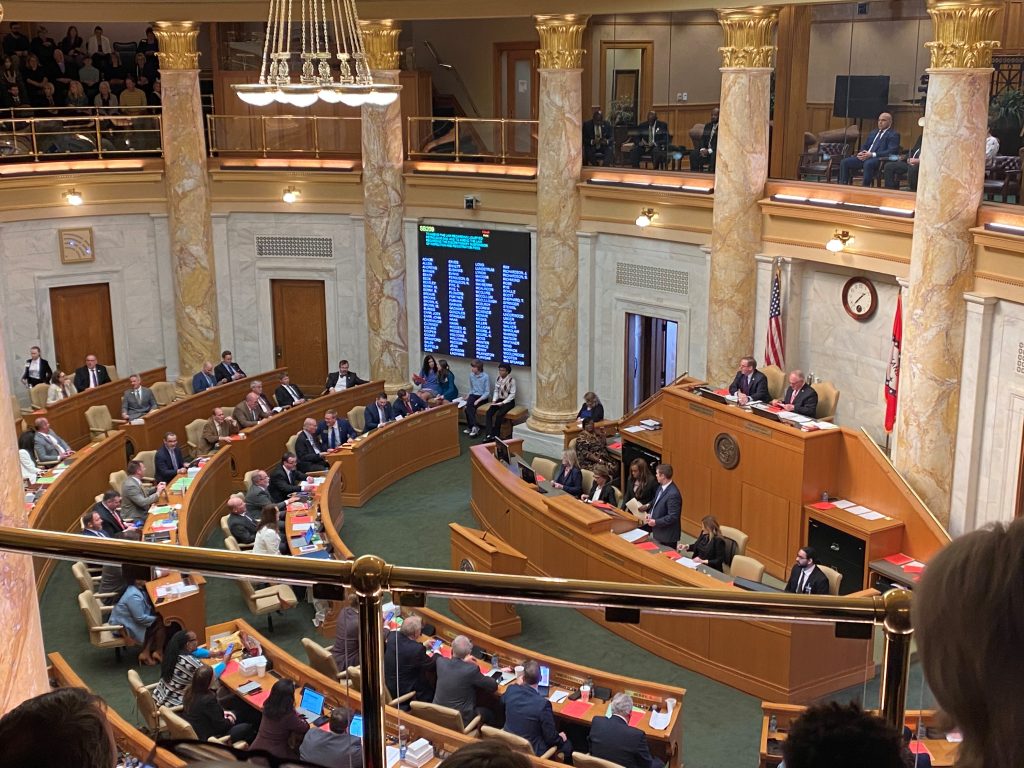
State legislators have been in Little Rock for a special session this week.
Below is a brief overview of legislation that has advanced through the capitol so far.
Income Tax Legislation
The Arkansas Legislature passed S.B. 8 by Sen. Jonathan Dismang and Rep. Les Eaves reducing income tax rates for individuals, trusts, estates, and corporations.
S.B. 8 does the following:
- Amends income taxes for residents, individuals, trusts, and estates whose net income is less than or equal to $87,000.
- Those who earn $0 – $5,099 pay 0% income tax.
- Those who earn $5,100 to $10,299 pay 2% income tax.
- Those who earn $10,300 to $14,699 pay 3% income tax.
- Those who earn $14,700 to $24,299 pay 3.4% income tax.
- Those who earn $24,300 to $87,000 pay 4.4% income tax.
- Amends income tax bracket adjustment amounts for those whose net income is $87,001 – $90,800.
- Amends the tax on corporate net income.
- Amends the tax on net income for foreign corporations doing business in Arkansas.
- Creates income tax credits for individual Arkansas residents whose net income is less than $103,600.
- Creates income tax credits for residents filing a joint tax return whose net income is less than $207,200.
Budgeting Surplus State Funds
The Arkansas Legislature has passed S.B. 1 and H.B. 1004 by Sen. Jimmy Hickey and Rep. Lane Jean. The bills budget $710,612,508 for a special sub-fund within the state’s Restricted Reserve Fund.
This money may be used from time to time for general revenue operating funds or fund accounts, the Miscellaneous Agencies Fund Account, and the State Central Services Fund.
These funds may be transferred upon approval of the Chief Fiscal Officer of the State and a ⅔ vote of the Joint Budget Committee or the Legislative Council committee.
COVID Mandates
The Arkansas Legislature passed H.B. 1002 and S.B. 3 by Sen. Joshua Bryant and Rep. Howard Beaty prohibiting the government from mandating vaccinations for COVID-19 and its subvariants.
These bills prohibit the state and its agencies from coercing individuals in any way for refusing to receive a vaccine or immunization for COVID-19 or its subvariants.
If a state official determines federal funding requirements make it is necessary for an individual to receive a COVID-19 vaccine, the state official must ask Legislative Council for approval to require the individual to be vaccinated before mandating the vaccine.
These bills would apply to the state, a state agency or entity, a political subdivision of the state, or a state or local official.
Freedom of Information Act Legislation
Lawmakers passed S.B. 10 by Sen. Bart Hester and Rep. David Ray exempting the following from disclosure under the Arkansas Freedom of Information Act of 1967:
- Communications concerning the governor’s security detail;
- Records that reflect the planning or provision of security for the governor, lieutenant governor, attorney general, secretary of state, auditor, treasurer, land commissioner, legislators, supreme court justices, or judges on the court of appeals.
The bill requires the Executive Protection Detail to give lawmakers a quarterly expense report that categorizes the expenses for the governor’s security.
Public School Safety
Legislators passed S.B. 4 and H.B. 1005 by Sen. Jane English and Rep. Brian Evans clarifying that public schools are not required to keep all their doors and exits unlocked during school hours.
Education Funding for Students With Disabilities
Lawmakers passed S.B. 5 by Sen. Breanne Davis and Rep. Sonia Barker addressing how students with disabilities receive educational services and access to additional funding under the state’s Philanthropic Investment in Arkansas Kids Program Act, the Succeed Scholarship Program, and the Arkansas Children’s Educational Freedom Account Program.
Felony Sentencing
The General Assembly passed H.B. 1006 and S.B. 6 by Rep. Jimmy Gazaway and Sen. Ben Gilmore clarifying that criminals convicted of certain egregious felony offenses involving a firearm are not eligible for early release or parole.
Articles appearing on this website are written with the aid of Family Council’s researchers and writers.



